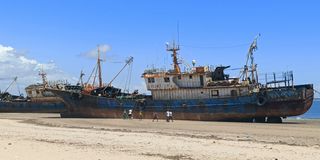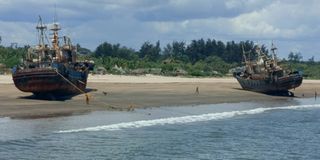
Two Fishing Vessels; FV Ahadi 001 and Ahadi 002, abandoned in 2020 have become an eyesore at Butwani Beach in Malindi. Kenya Maritime Authority (KMA) has issued a gazette notice to possess the vessels to avert further ecosystem degradation.
The Malindi Pier is a cherished landmark and a central point at the Indian Ocean beach where locals gather to play soccer, swim and unwind.
However, the pier popularly known as Butwani and a fish landing site, has lost its appeal over the past four years.
This is due to two long rusting ships; Ahadi 001 and Ahadi 002, abandoned at the shore over ownership and licensing disputes.
The two vessels aren’t just an eyesore, but an environmental and navigational hazard.
They have turned out to be a pollution risk, and going by the size of the ships, they have resulted in a massive spill of oil, chemicals, and other hazardous materials, according to stakeholders in the maritime sector.
Local fishermen have raised concern over the effects of the ships on fish as beach guides and traders say business has dwindled because tourists fear loose rusty metals shredding from the vessels which are scattered on the beach.
“We used to have many tourists in the famous ‘Golden Beach’ but currently the numbers are low as a result of loose rusty metals in the beaches. Tourists prefer walking barefoot but now they cannot due to the dangers brought about by the old dilapidated vessels,” said Blanco Charo, chairman of Golden Beach operators.

Two Fishing Vessels; FV Ahadi 001 and Ahadi 002, abandoned in 2020 have become an eyesore at Butwani Beach in Malindi. Kenya Maritime Authority (KMA) has issued a gazette notice to possess the vessels to avert further ecosystem degradation.
Mr Farah Abdalla, a local fisherman said since the vessels drifted to the shores, they have caused detrimental effects to the ecosystem and affected fish breeding.
“Butwani beach was one of the largest crab and lobsters collection centre, we cannot blame the two vessels as main reasons for the decline of catch but they have played a role due to pollution through seeping fuel,” said Mr Abdalla.
Following complaints about the challenges posed by the vessels, the Kenya Maritime Authority (KMA) started removing the two abandoned fishing vessels in Malindi which allegedly had been at the centre of illegal fishing, leading to the revocation of their licenses.
The two crab fishing vessels Ahadi 001 and Ahadi 002 were deregistered in 2020 for allegedly contravening maritime laws.
The two ships were banned from operating in any water bodies worldwide.
According to the International Maritime Organisation (IMO) database, the Ahadis were built in 2016, both with a gross tonnage of 298, and owned by Korean nationals but operated by the Chinese.
Stranded workers
In 2020, 15 seafarers lamented that they were left stranded by their Korean employer, the vessel captain and engineer in Kilifi without proper remuneration.
They claimed they were in distress because they had not been paid for three months, with accumulative salary arrears amounting to more than Sh1.9 million.
The two vessels have been under investigations for several years including on how they were operating under two different flags.
“The vessels were allowed to dock in Malindi as investigations were ongoing but since then, the owner has disappeared. It is illegal for any vessel to fly two flags,” said one of the officers privy to the investigations who requested anonymity for lacking authority to brief the press about the matter.
In a gazette notice published on November 8, KMA acting Director-General Julius Koech said the authority had taken possession of the two vessels which shall be removed from the site.
Mr Koech also said the vessels were an obstruction and danger to navigation and that their removal was paramount.
"A declaration is issued under section 323 of the Merchant Shipping Act, 2009 that the two marine motor vessels, previously known as Ahadi 001 and Ahadi 002, are abandoned on the coast at Malindi, Kilifi County, and are an obstruction and danger to navigation and a threat to the marine environment.
“The director-general has taken possession of the said vessels and shall remove them per section 322 of the Merchant Shipping Act, 2009," read the notice in part.
In an exclusive interview with Nation.Africa, Mr Koech said illegal fishing needs to be combated to provide a conducive fishing environment for all seafarers.
He added that the owners have not responded to their calls and that they would consult further in line with international laws on the next way forward.
"This is a unique case and the law is silent on what to do with such vessels whether to auction or not. For now, we are removing the vessels to avert maritime crisis, including further pollution, as we consult on what is next for the vessels," said Mr Koech.
He added that in previous instances where vessels were caught going against maritime laws, the owners would reach out to the authority to find the best solution, but in the current scenario, the owners are unreachable.
According to the IMO, fraudulent ship registration is a significant global concern, impacting maritime safety, security, pollution control, seafarers’ welfare and ocean governance.
The issue has gained prominence given the increase in incidents and the emergence of a “dark fleet” that engages in clandestine operations to avoid sanctions and high insurance costs.
Since 2018, the IMO Legal Committee has focused on combating fraudulent ship registration and registries.











